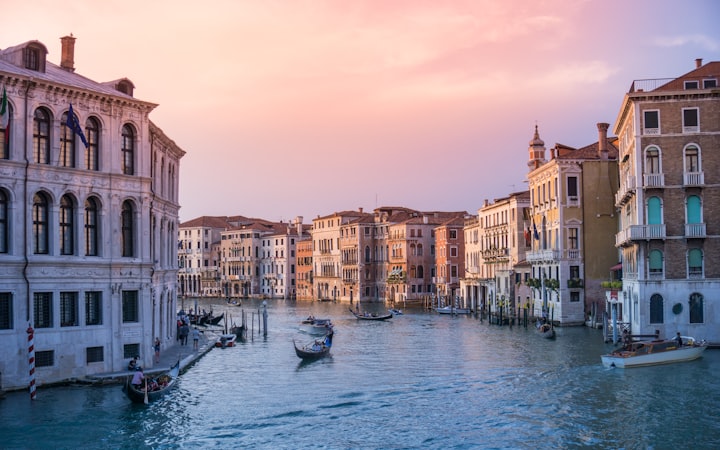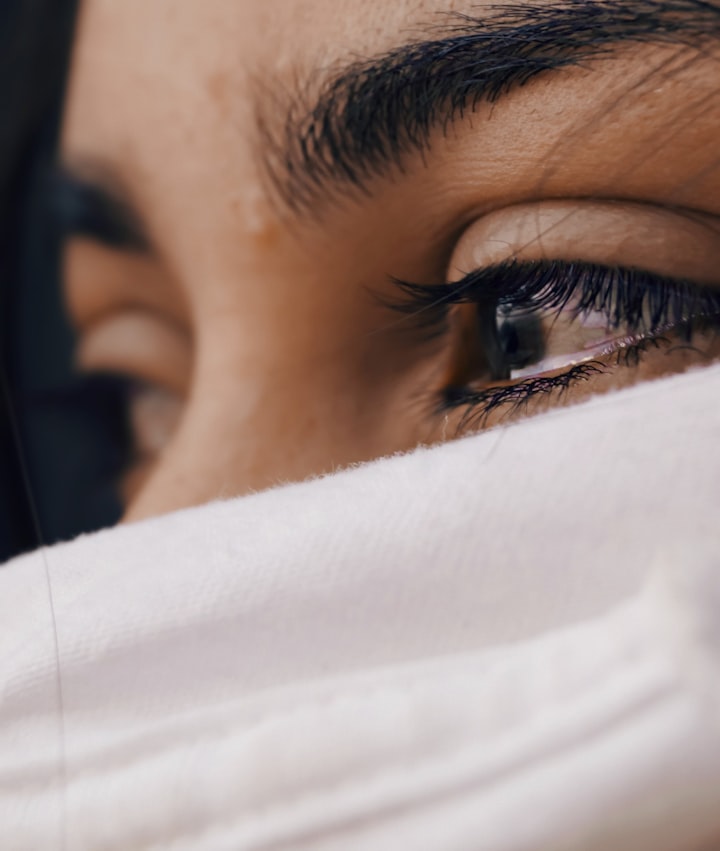The Grand Scheme of Things
The Grand Scheme of Things

On the last day in Venice it rained. The city on the water was still beautiful, still had an elegance to her, just as an aging Hollywood star possesses a glimmer of youthful allure. Puddling through the narrow alleyways, I heard only the sound of sloshing footsteps and umbrellas scraping against the brick walls as I passed alongside strangers, lifting my umbrella up or down to accommodate the oncoming tourist.
Instead of a regal antiquity that Rome exuded, Venice was her counterpart who — while rooted in rich history — almost didn’t seem real. The man-made canals, quaint stores to appeal to the millions of tourists who visit each year, and the sole disco club open from 11 pm to 4 am gave the city an artificial, constructed aura.
Outside of my destination, I reached down to trace the hard binding through the canvas of my tote bag. Still there. Looking up, my eyes didn’t know where to land — leapfrogging from the faded brick walls to a stranger’s baseball cap, finally deciding to seek refuge on the patterns of the water as the sun began to set.
—
I forced my eyes to focus on anything else in the restaurant but the door. I wasn’t sure he would be here, but the way his voice sounded on the phone call a few days ago reassured me. A little.
The restaurant seemed to encapsulate the city all at once — dark maroon wallpaper with delicate patterning, an excess of vintage posters sealed with aging gold frames, but most of all, a type of permanence that married the decorations and the city of Venice itself. One additional photograph or chair, and it would all lean at an odd angle, something my professors once told me was a blessing — only great painters could identify. Or was it a curse?
I wondered what the restaurant would look like at night — when all the waiters and chefs and managers closed the shop, locked it for good before the next working day. These framed paintings and posters would still hang there perfectly, while the whizzing and whirring of daily life blew past them in a time-lapse frenzy, until the next yawning onlooker contemplated their existence.
Sometimes I pondered if this is how other people looked at my paintings. I closed my eyes and I was back in New York, the night my painting sold at an auction for a considerable sum. The first considerable sum I accumulated that wasn’t college debt. When I called my mom to tell her the news, she whispered under her breath, shaking her head in pride and disbelief, “Twenty-thousand dollars…” for a week straight.
I adjusted my scarf and took a sip of water. Four years ago, I was sitting in this exact spot. On a spontaneous, perhaps naive, trip after graduating from a quaint arts college on the east coast, I spent a few days in Venice alone. I was ending my gap year without much momentum, it seemed. My friends had all started their adult jobs — investment banking, tech start-ups, the treadmill towards a ‘successful’ life. The truth was, I hadn’t produced a single painting the entire year. The money for this trip was all that was left in my savings. So as I sat spiraling the pasta on my fork at a table meant for two, I felt a loneliness that jabbed me almost suddenly in the gut — I was wading into deep water, and I didn’t know how deep it would get.
At that moment I became aware of eyes lingering on my face, and when I found the culprit I was startled that they belonged to an older, elderly gentleman sitting a couple tables away from me. Also alone.
He continued to glance over, and finally took his plate and hobbled across from me, pulling out the other chair. I wondered at what age I would unlock that type of fearlessness.
“You look like you could use some company,” he said softly with a slight twinge of an Italian accent. His voice sounded youthful, rich and booming, unlike the wrinkled canvas of his face.
I slurped up the bit of pasta on my fork in a hurry to respond--caught off guard. “Oh, yes.” I chuckled nervously. “Thank you.”
“What do you have there?” he gestured to the small red journal at the corner of the table, placed as close to the edge as possible — as if I wanted it to fall off and lose it, once and for all.
“That’s my drawing journal, but it’s quite empty… I haven’t really been sketching much,” I muttered.
“Oh, you’re an artist?” His eyes lit up, and he leaned forward in his chair a bit more.
“Well, I’m a painter to be more specific. But it’s all the same in the grand scheme of things, I guess.”
I shifted in my seat. I wasn’t comfortable with strangers, and never earned the title of ‘social butterfly’ as a child. Outside, I smiled on, avoiding direct eye contact. Inside, my mind was working at a strained pace to come up with socially acceptable responses.
Without warning, the elderly man pulled out from inside his wool coat pocket a little black notebook and set it on the table. It was small but had a certain weight to it, as though the pages themselves contained things that weren’t meant to be confined to paper. It curved slightly from the wrinkling of the pages, and I noticed how it mirrored the wrinkling of his hands as he slowly unfurled the elastic binding and exposed the contents.
It was only half-filled, but as he turned every page, my eyes entered in a desperate race to keep up — I wanted to absorb every drawing, every sketch, as the subject changed from intricate portraiture, to rough landscapes of the aging city. Some were done in pen, others in pencil.
At the last page, he looked up at me and said gingerly, “I don’t know if it’s as good as the stuff you do, but it’s always nice to see someone else with a sketchbook.”
I finally looked him directly in the eyes. They were brown, like mine, but his irises glowed like pools of honey, giving his aging face an eternal brushstroke of youth. “Um, these are… really beautiful. How long have you been drawing?”
For the next hour, we sat there and shared — the sun dropping down to reflect long glimmering beams along the canal water, patrons entering and leaving with the jingle of the bell. I learned that he took on drawing at the age of sixty-seven when his wife became ill and couldn’t leave the house as often. For nine years he brought the city of Venice to her bedside, never leaving a single detail out. Every passerby, gondola, cloud in the sky was frozen at her command. When she passed, he continued to draw for her.
“But frankly, I had no one to show them to. I guess that’s why you’re here right now,” he laughed, but in his eyes I could see that there was sorrow and grief he would never be rid of.
When I lost my grandfather, I buried myself in the cave of my room to paint--skipping meals, days bleeding into each other. I broke the dark streak of my canvas with a tinge of white, forgetting the brush still had remnants of black. Grey emerged, and didn’t leave for a long time.
Before I could respond, he glanced down at his watch and realized he was late. As he pushed his chair out and slowly stood up, he paused and turned towards me again, reaching into his coat to pull out the notebook.
“Just keep it. Forget the one you have, you’ve barely used it! Continue mine for me, okay?”
I stared blankly back at him, my mouth a little open. “Oh, wow, thank you.”
With a wink and a brush of his coat, he was gone.
—
Over the next year, the little black notebook never left my sight. It befriended my dining table, ratty couch, car seat, the tables of my favorite coffee shop, and once was accidentally abandoned on the New York subway, like a child left at the grocery store — only much, much worse. Everyone knows the law of the land : once you leave something on the subway, a tiny small vortex sucks it up into a black hole, never to be seen again.
When it miraculously returned to me, I knew that the notebook was charmed with something otherworldly. My first sketch in that notebook later became the painting that sold at the auction. So when I found out the news, my first thought was that I have a different type of debt to pay: a thanks to give to the stranger in the restaurant that evening.
—
I never got his first name. The inside cover of the notebook was scribbled with a barely legible “A. Morelli” and a phone number. For years I had his name saved as a contact on my phone, just for the comfort of it. To know someone believed in my work.
When I called last week, I was shocked to hear a voice on the other side. All these years when I thought about reaching out to him, I felt as though I might be looking at a star in the sky — the light emitted from years ago just reaching us now. The distance, the time, the gap in life experience between us two. Yet he sounded elated to hear my voice, remembering me instantly — and now I was sitting here, waiting.
—
The moment he finally walked through the door, the nerves that racked my body seemed to dissipate instantly. He hugged me before sitting down, and I buried my chin into the same wool coat I saw years ago. After we both ordered our food and caught up on life, I pulled out my phone to show him the painting that granted me the very trip here.
“My god, that is beautiful. You really captured the city. Bravo!” He gestured his arms in the typical Italian way — and I couldn’t keep from smiling. I kept watching his expression, seeking the proud approval that was hard to come by in my parents sometimes, but seeming to overflow within him.
Finally, I reached into my bag and pulled out the little black notebook. It gained a few more years of life in New York, but still appeared just how it did the first night we met. I flipped it open to the first page I started after his sketches. “This was my first sketch. I wanted to say, um, thank you for lighting the spark in me again to draw.”
His face took on a new expression, one I hadn’t seen before. I reached out to grab his hand.
“I also want to return it to you. You should sketch from it now...maybe in a few years you can give it back to me.”
As he wiped a tear from his eye, I stood up and told him I’d use the restroom quickly. My plan when I returned was to see if he wanted to take a stroll around outside before the daylight ran out, maybe take a picture together.
After I dried my hands and breezed past a waiter to get back to our table, I stood frozen in my tracks. He was gone. As I walked closer, I saw the little black notebook sitting neatly next to my plate. I picked it up, in disbelief that he didn’t want to stay and chat longer. Or to say a proper good-bye.
I opened the notebook to the bookmarked ribbons, and saw a small portraiture of a young woman, eating pasta at a table. At this table. It was me. A tiny note below, the first of its kind in a sea of sketches:
“Okay. Now your turn.”
I closed the notebook, peering out the window to see the sun finally set over the water. Maybe I could still catch him.






Comments
There are no comments for this story
Be the first to respond and start the conversation.